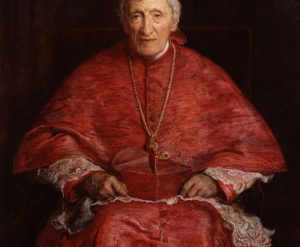On Wednesday 9th October the Church will celebrate the feast of Cardinal Newman. John Henry Newman was born in London in on the 21st February, 1801. He was the eldest of six children, three boys and three girls. His father was a banker and Newman was educated locally before entering Trinity College, Oxford. A brilliant student, he delighted in reading his Bible and, following a period in Oxford, he was ordained an Anglican priest.
At that time in Newman’s life, while he saw the Catholic Church as being in error, he worried about the lax nature of the Anglican faith. Newman wrote extensively aiming to make the Church of England more disciplined and sounder in its doctrine. He had a huge influence, but this did not prevent him being much criticised. In 1842, Newman withdrew from public life to live a monastic life, writing and reflecting until, three years later, he was received into the Catholic Church. Ordained a priest in 1846, he wrote many articles, books, poems and prayers. Most of us will be familiar with his hymn, ‘Lead Kindly Light’, and prayer, ‘O Lord, support us all day long until the shadows lengthen, the evening comes, the fever of life is over and our work is done. Then in your mercy grant us a safe lodging, a holy rest and peace at the last.’
At the invitation of the Irish Bishops, Newman came to Dublin to found the Catholic University of Ireland which later evolved into University College Dublin. Newman was deeply interested, and involved, in education. His writings defended Church doctrine and social justice. He was a man of deep faith and spirituality and his writings reflect the depth of his spiritual life.
In 1879 Pope Leo XIII honoured England by making John Henry Newman a Cardinal. He died in 1890 and on the 13th October 2019, Pope Francis presided at his Canonization.
A number of Cardinal Newman’s sayings have entered our daily speech: ‘To live is to change, and to be perfect is to have changed often’. ‘Growth is the only evidence of life’ and ‘I shall be an angel of peace, a preacher of truth in my own place, while not intending it, if I do but keep his commandments’.
From the Ennis Parish Newsletter (Adapted)
